The eggs have begun hatching! To my inexperienced self this is such a surprise! Our broody hen, Not Blanch, went broody in the beginning of October when temperatures started dipping down in the low 40s from time to time at night. We had a number of cold rainy days, as mentioned in the previous post about Moving a Broody Hen. Not only did it seem to me that the weather was working against our broody buff orpington, we worried that having to move her and her nest would disrupt the process enough to break her of her broodiness.
On day 21 of incubation, the typical time it takes to hatch an egg, I was away at work and expected to get a call that the eggs had begun hatching. We’ve been dodging rain and wind storms since Not Blanch went broody and this was finally expected to be a nice couple of days when the chicks were due. Day 21 came and went and no changes, the same with day 22. I was beginning to expect the worst, with the all the adversity Not Blanch and her eggs had endured, but still tried to remain hopeful that one or two would hatch.
Day 23- another rain storm was on the way. We were gone in the morning and upon returning around lunch time, I was certain I saw a little dark ball in front of our broody hen. It was dark inside the brooding cage and with all the shadows I couldn’t be sure. By the time I retrieved a flashlight, Not Blanch had repositioned and the dark mass was gone.
I checked back a little while later and was so gleefully surprised to see two chicks!
It was getting darker and colder by the minute and when I felt we couldn’t wait any longer, we moved our broody hen and her eggs and hatchlings into our mudroom for more cover. At this point we realized that she had already hatched out 6 chicks. We had prepared our kids’ shallow swimming pool with some wood shaving bedding and the food and water dispensers. After a bit of observation I decided to add an inch of our clay dirt/small rocks under the wood shavings so mother hen could get traction to reposition. Her feet seemed to be sliding out sideways and she seemed to struggle a bit. After this change, all looked comfy.
Day 23 through 25 the eggs continued to hatch. We now have THIRTEEN beautiful buff orpington black australorp cross chicks.
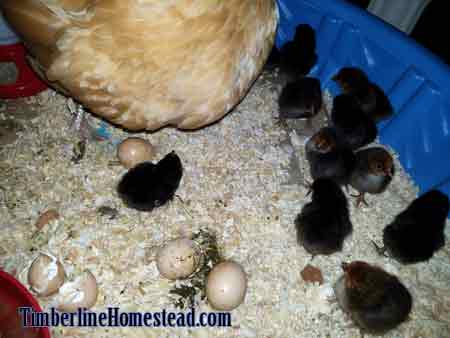
This is our Black Australorp rooster.
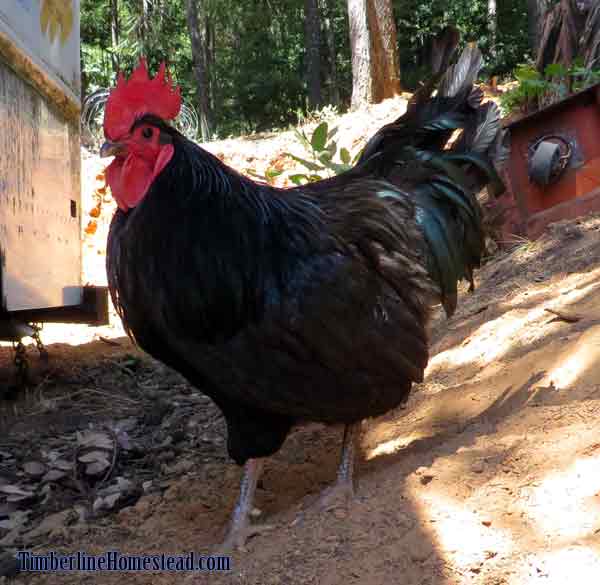
Our focus, now that the chicks have hatched, has shifted to preparing a small coop and covered run for Not Blanch and her babies. We don’t want to separate them to allow for the babies to stay in the mudroom and a mudroom is no place for a full grown chicken! I’ve learned that buff orpingtons have a reputation of being broody and motherly and Not Blanch has proven this to be true so far. She is nothing short of a dutiful, protective mother and I have all the confidence that she will keep her chicks safe outdoors if we provide a coop and covered run.
Our reason for not lumping the babies and mother in with the other hens and rooster is simply because we don’t want to stress anyone. I do believe Not Blanch is fierce enough to keep her children out of harms way, but thirteen is a lot to look after and I want to make her job as easy as reasonably possible.
For now, the thirteen chicks and mother hen will remain for a couple more days in the mudroom.
 Timberline Homestead A self sufficient homesteading life
Timberline Homestead A self sufficient homesteading life
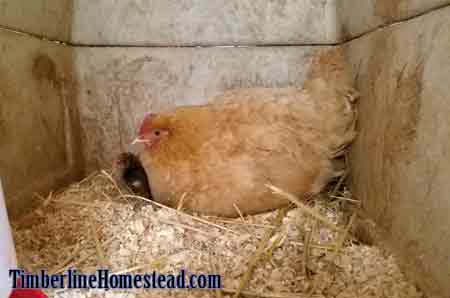
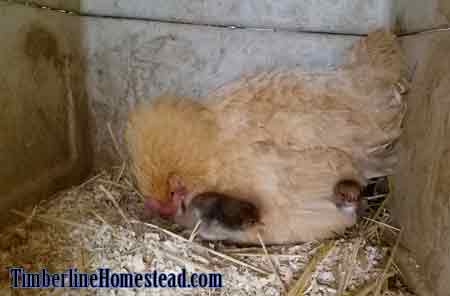
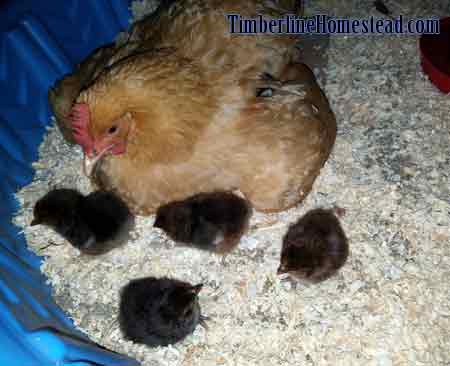
I have a hen that has been sitting for two weeks and all of a sudden she is letting the eggs alone during the day. The weather is cool and rainy and I am worried that she is going to kill the embryo before they hatch. The temperature is in the mid 60’s at this time. She had 13 eggs under her for so long. I have candled them and they have the veins and all show to be viable at this time. I noticed she is out again today. I have place some under another broody hen in the hopes to at least save some of them. Should I worry or just let her take care of it?
Hi Peggy,
Unfortunately there’s no way to know with certainty if it’s time to intervene or not.
My opinion, based on our experience with 2 very different broody hens, is if you’re willing and able to take on the mother hen role and incubate the eggs then care for the hatchlings in a brooder until they graduate to living outside, intervene whenever you’d like.
On the other hand, if you’re like us and need the mother hen to care for the chicks, cross your fingers and try not to stress too much while nature runs her course.
I did get involved in our second broody hen’s process and wish I hadn’t. She was showing signs of lacking the strong mothering instincts during the sitting phase (she seemed uninterested, didn’t mind if I touched her eggs, didn’t recognize her clutch when I moved it to the broody coop) and ultimately turned out to be an inadequate mother. She left some partially hatched, otherwise healthy babies too long and they didn’t make it. This heartbreaking experience confirmed we won’t try to force the issue in the future if mom quits before eggs start hatching.
Whatever you decide, I wish you the best and hope for lots of healthy chicks in your future. Keep us posted!